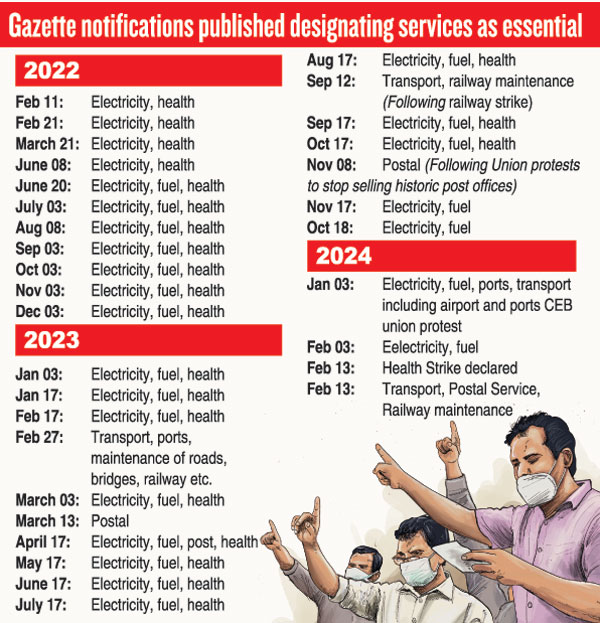News
ESA: Questions over Govt.’s preemptive strike ahead of trade union action in vital sectors
View(s):By Mimi Alphonsus
Since January last year, the government has invoked the Essential Services Act (ESA) twenty-one times with the aim of ensuring that public services are not disrupted due to trade union action in critical sectors.
Earlier, to block trade union action in vital sectors, the governments imposed regulations under the State of Emergency that ended in August 2022.
The extraordinary gazettes under the ESA are issued by the President and have raised the ire of trade union leaders who allege the law is being misused. There were 17 in 2023 and four so far this year. The health, electricity and fuel sectors are the most frequently affected.
Declaring a public service “essential” makes certain trade union activity—notably strikes—illegal. To qualify, the sector must be on a schedule of essential services; the President must have a reasonable belief that service is “likely to be impeded or interrupted”; and the President must ascertain that the service provided is “essential to the life of the community”.

Each gazette is valid for one month and, in some cases, has been periodically renewed when there is unrest or an increased possibility of trade union action. An examination of the gazettes shows a link between their issuance and ongoing or expected trade union unrest.
For instance, a directive came into effect on February 13 this year—the day 72 health unions (except doctors) announced a strike requesting an increase in an allowance. The problem is, however, when these gazettes are issued despite there being no “reasonable” anticipation of a disruption.
On January 3, 2024, the distribution of electricity was declared to be an essential service in anticipation of Ceylon Electricity Board (CEB) union action. However, it was a protest and not a strike.
“We were very clear that the planned days of action—January 3, 4, and 5—will be a protest and not a strike,” said a senior official of the CEB Engineers Union (CEBEU). “That period did not see any power outages, so it was not disruptive to the public.” He did not wish to be named.
This official said he believed that routinely declaring electricity as an essential service was not aimed at ensuring uninterrupted supply. Rather, it was intended as a scare tactic to suppress trade union action aimed at finding redress for genuine grievances, particularly about the lack of transparency in privatisation drives.
But CEB Deputy General Manager Noel Priyantha argued that although the letter CEB unions handed over to the management was about a protest, it also warned of a strike. He, therefore, justified declaring electricity supply an essential service and the CEB management’s disciplinary action, including leave cancellation.
Under the ESA, the President must satisfy himself that “the maintenance of the service provided by that category of persons is essential to the life of the community”. On November 8, last year, the Lanka Postal Services Union launched a token strike against the planned lease of the Nuwara Eliya post office. The same day, the postal service was gazetted as essential, and the leave of workers was cancelled. The union alleged that this was done merely to block the lease of the post office, rather than to maintain the postal service.
“We are happy to have been gazetted,” one official quipped. “At least now we get recognition as an essential service!”
The vagueness of the ESA does not help in such situations. It is unclear whether invoking the law in the manner it was intended includes banning strikes of essential service workers under any circumstance—or only under exceptional circumstances, such as COVID-19 or natural disasters.
Thishya Weragoda, an attorney-at-law who regularly represents unions, says this gap makes the entire act “draconian.” The government should ensure the continuation of essential services through multiple methods, not just prohibitive laws, he said.
“But when they have the option of using a draconian act, there is no reason to explore alternatives,” Mr. Weragoda added. “When you have such a useful tool, why burn your fingers?”
Many of these questions could be answered—especially whether governments misuse powers granted by the ESA—had there been more transparency. Unfortunately, the gazette declarations do not define the basis on which a specific service is deemed “likely to be impeded or interrupted” or “essential for the life of the community.”
The Presidential Secretariat did not respond to a request for clarification. Thus, allegations of misuse are difficult to put to rest.
Prathiba Mahanamahewa, attorney-at-law and former member of the Sri Lanka Human Rights Commission, said any government must have tools to guarantee uninterrupted essential services to the people. At the same time, it must safeguard employee rights.
Trade union actions, including lunchtime picketing, demonstrations, “go-slow” campaigns and token strikes were not significantly disruptive and, thus, not ESA violations, Mr. Mahanamahewa noted.
The best way to say that you found the home of your dreams is by finding it on Hitad.lk. We have listings for apartments for sale or rent in Sri Lanka, no matter what locale you're looking for! Whether you live in Colombo, Galle, Kandy, Matara, Jaffna and more - we've got them all!

